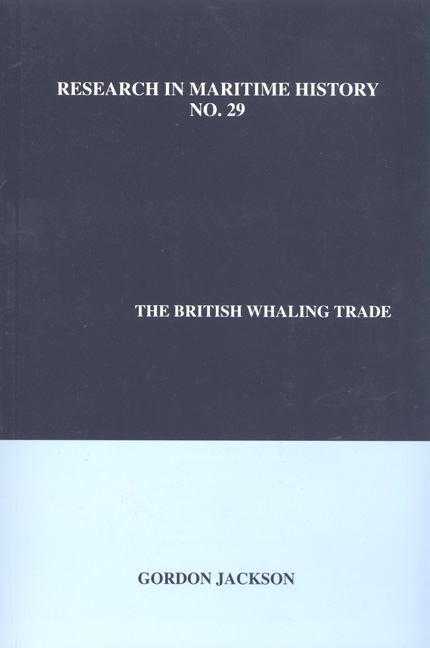Book contents
- Frontmatter
- Dedication
- Contents
- List of Tables in the Text
- List of Appendices
- New Introduction
- Preface
- Part One The Traditional Whaling Trades, 1604-1914
- Chapter 1 Northern Adventures and the Spitsbergen Trade, c. 1604-1670
- Chapter 2 Lost Hopes and Expensive Failures, c. 1670-1750
- Chapter 3 The Rise of the Greenland Trade, 1750-1783
- Chapter 4 The Boom in the Northern Fishery, 1783-c. 1808
- Chapter 5 Expansion South of the Arctic Seas, c. 1776-c. 1808
- Chapter 6 Decline in the North in the Early Nineteenth Century
- Chapter 7 Expansion and Failure of the Southern Fishery, c. 1808-1840
- Chapter 8 The End of the Northern Fishery in the late Nineteenth Century
- Part Two The Modern Whaling Trade, 1904-1963
- Conclusion
- Appendices
- Select Bibliography
- Additional Bibliography
- Index
Chapter 3 - The Rise of the Greenland Trade, 1750-1783
from Part One - The Traditional Whaling Trades, 1604-1914
- Frontmatter
- Dedication
- Contents
- List of Tables in the Text
- List of Appendices
- New Introduction
- Preface
- Part One The Traditional Whaling Trades, 1604-1914
- Chapter 1 Northern Adventures and the Spitsbergen Trade, c. 1604-1670
- Chapter 2 Lost Hopes and Expensive Failures, c. 1670-1750
- Chapter 3 The Rise of the Greenland Trade, 1750-1783
- Chapter 4 The Boom in the Northern Fishery, 1783-c. 1808
- Chapter 5 Expansion South of the Arctic Seas, c. 1776-c. 1808
- Chapter 6 Decline in the North in the Early Nineteenth Century
- Chapter 7 Expansion and Failure of the Southern Fishery, c. 1808-1840
- Chapter 8 The End of the Northern Fishery in the late Nineteenth Century
- Part Two The Modern Whaling Trade, 1904-1963
- Conclusion
- Appendices
- Select Bibliography
- Additional Bibliography
- Index
Summary
By the mid-eighteenth century politicians were well accustomed to arguments about the advantages derived from trade. Pitt's famous dictum, “When trade is at stake you must defend it or perish,” echoed views that had inspired the Navigation Laws a century earlier. Since the sum of world trade was limited, trade warfare was necessary to increase the British share of world prosperity, a prosperity which could only come about, according to the “bullionist” theory that still held sway, when Britain imported more gold than she exported. Matthew Decker put the matter succinctly in his Essay on the Decline of Foreign Trade in 1739; “if the Imports of Britain exceed its Exports, we must pay foreigners the balance in Treasure, and the Nation grow poor.” The basic unsoundness of bullionist theory (gold flows alter the terms of trade and, if left alone, are selfrighting) did not detract from its popularity, and from the time of Walpole governments had considered it their duty (encouraged by vested interests), to use protection and bounties to encourage British industry and shipping in their “fight” with foreigners.
Some trades were permanently in the red: bullion had to be shipped abroad to pay for the luxuries from the East Indies and the raw materials from Northern Europe. Any savings that could be made elsewhere were therefore particularly welcome, and the Greenland trade seemed a useful trade to defend - or encourage. It was, moreover, a trade which, with the other fisheries, had long been venerated as a “nursery of seamen,” hardened to the worst of conditions. The naval inadequacies uncovered by the War of the Austrian Succession (1740-1748), and the likelihood of further world-wide conflicts, persuaded government to invest in fishermen. “Though the tonnage bounties,” wrote Adam Smith,
do not contribute to the opulence of the nation, it may perhaps be thought that they contribute to its defence by augmenting the number of its sailors and shipping. This, it may be alleged, may sometimes be done by means of such bounties at a much smaller expense than by keeping up a great standing navy…
With these factors of wealth and security in mind the bounty on fishing boats was advanced to thirty shillings per ton in 1750, and that on whalers, which had hitherto failed to respond to bounties, to forty shillings per ton.
- Type
- Chapter
- Information
- The British Whaling Trade , pp. 47 - 60Publisher: Liverpool University PressPrint publication year: 2004



